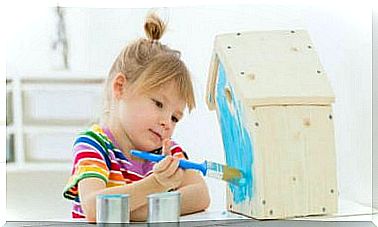4 Strategies To Help Your Children Gain Good Self-esteem

Personal welfare is absolutely essential when it comes to being able to fulfill our dreams. While for many people this is something that is innate, it is more difficult for others, especially in childhood. In these cases, we need to make sure that we teach our children to love themselves more, and have a good self-esteem.
The phrase “to love oneself more” may sound a little broad. It may even seem like something that does not need to be clarified, as every child in theory will love themselves. But there is no harm in helping children take care of their self-esteem in a healthy way.
Personal appreciation and perception of one’s abilities creates a feeling called self-esteem. This is a key factor for a child to have a healthy and happy development. In this article, we will point out its relevance and the methods needed to improve it.
Problems with children who do not have good self-esteem
There are certain patterns of behavior that may indicate that something is not quite right with regard to a child’s self-esteem. All of these can either be avoided or handled in a better way, whatever the case may be.
- He is often sad for no apparent reason.
- He refuses to do activities alone.
- He has no interest in spending time with friends.
- He is not open to his family, nor does he express himself.
- He cannot relate to people he does not know.

4 strategies to teach your children to have good self-esteem
As a mother, it is important to pay attention to what you should and should not teach your children, to make sure they have a better self-esteem. Pay attention to the following strategies and make sure to apply them in daily life.
Set aside time for them
In this first point, we will focus on a basic rule when it comes to upbringing. Parents must set aside quality time for their children. This will make them feel valuable, listened to and understood. They will realize that they are important to their parents.
It is important that you stop what you are doing when your children really need you. This is the best way to show them that their problems are important to you and that you are willing to help them find a solution.
Additionally, you can take advantage of this attachment to set values in them, teach them, and learn to recognize and accept their strengths and weaknesses.
2. Deal with their successes and failures correctly
Childhood is a phase of life filled with constant learning. Therefore, it is logical that your children will make mistakes. The question here is how to deal with these errors. Instead of questioning their actions or even their abilities, show them that they can always get something positive out of every setback.
In addition to promoting the importance of resilience, you also need to act correctly when they achieve their goals. You should acknowledge their achievements and congratulate them on their success and commitment. It is also important that you do not make comparisons between them and what their siblings or friends have done.
This way, your children will notice that you are interested in their development. They will see that you are there to guide them and help them when they need it. But be careful that the latter never means that you prevent them from making mistakes at all costs, or that you give them the solutions. It’s about doing the opposite.
Teach them to interpret their emotions
The so-called emotional intelligence is a key aspect that enables children to grow during their childhood. In these situations, you should teach your child to interpret their feelings, and act properly in response to them.
It is important that you listen to your child and help them understand that what they are feeling is normal. They should not feel uncomfortable being scared, worried, anxious or sad about something. These are completely normal emotions that we all experience.

4. Be a good example to your children and give them constructive feedback
Your children learn everything from you, even when you are not teaching them anything special. Therefore, based on your actions, show them the idea of taking positive risks, taking responsibility, and above all, being respectful, loving and understanding of others.
On the other hand, when you experience that they are making mistakes or behaving unacceptably, do not attack their self-esteem. When teaching your children to love themselves more, deal with their actions and not their abilities.
So, for example, instead of saying, “You’re bad at math, you’ll never learn it,” you should instead say, “Look, you’re doing it the wrong way. Concentrate and practice, and you’ll learn quickly. that. “It may seem insignificant to you, but it really makes a difference between a confident child and a child with low self-esteem.
Finally, you should not forget the “minor” actions that are also very important. You must try to establish healthy boundaries and always be loving. That way, you teach your children to have good self-esteem. It will be a great tool for their lives!









